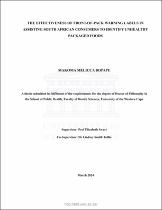| dc.contributor.advisor | Swart, Rina Elizabeth Catherina | |
| dc.contributor.author | Bopape, Makoma Melicca | |
| dc.date.accessioned | 2024-04-10T10:20:45Z | |
| dc.date.available | 2024-04-10T10:20:45Z | |
| dc.date.issued | 2024 | |
| dc.identifier.uri | http://hdl.handle.net/11394/10736 | |
| dc.description | Philosophiae Doctor - PhD | en_US |
| dc.description.abstract | Background: Unhealthy diets that are excessive in energy, saturated fats, trans-fat, sugar and salt are associated with obesity, hypertension, diabetes mellitus, coronary heart diseases and some cancers. Globally there is a decline in consumption of traditional diets and an increase in preference for energy-dense processed food, and South Africa is no exception in this regard. Concurrently, the prevalence of obesity and obesity-related complications is on the increase in South Africa and worldwide. The development of a simplified front-of-pack labelling (FOPL) system is one of the critical steps in assisting consumers to identify unhealthy food products and consequently contribute to stemming the obesity trajectory and its related complications. | en_US |
| dc.language.iso | en | en_US |
| dc.publisher | University of the Western Cape | en_US |
| dc.subject | Nutrition | en_US |
| dc.subject | Obesity | en_US |
| dc.subject | Noncommunicable diseases (NCDs) | en_US |
| dc.subject | Front-of-pack labelling (FOPL) | en_US |
| dc.subject | Food selection | en_US |
| dc.title | The effectiveness of front-of-pack warning labels in assisting South African consumers to identify unhealthy packaged foods | en_US |
| dc.rights.holder | University of the Western Cape | en_US |

